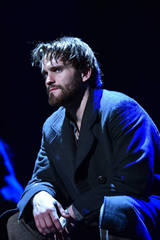| Opera Reviews | 28 April 2024 |
An intimate take on a big spectacleby Steve Cohen |
|
| Higdon: Cold Mountain Opera Philadelphia February 2016 |
|
|
Try to forget that it’s based on a 1997 best-selling novel and a 2003 wide-screen movie. It’s difficult to take that view because the opera has a large cast and massive set, but Cold Mountain’s rewards come from the intimacy of the plot and the characters. The lack of this focus contributed to the negativity in the review by the New York Times, and to the mixed reactions from David Patrick Stearns in the Philadelphia Inquirer and me, here, when the opera premiered in Santa Fe last August. The production was physically the same, but the enclosed confines of the Academy of Music gave it a more intimate presence, as did the lyrical conducting of Corrado Rovaris (who was not involved in Santa Fe). In a sense, the mountain thaws out when you approach it from a different perspective. Charles Frazier’s story is about the Civil War soldier W.P. Inman (Jarrett Ott) who deserts from the Confederate army to travel home to his North Carolina mountain. Inman’s trials along the way are reminiscent of Homer’s Odyssey, but not as monumental as Ulysses’ adventures with Calypso, Circe, Cyclops and the Lotus-Eaters. Inman meets earthy characters like a bounty hunter who wants to capture Confederate deserters, an escaped slave who hates all white people, and a widowed mother who craves sleeping in a man’s arms. He carries the memory of Ada Monroe (Isabel Leonard), a minister’s daughter whom he met just before the war began. As four years go by, and the constellation Orion repeatedly rises and falls from view, Inman wonders whether he can resume a normal life with the woman he loves after experiencing the horrors of war. Higdon has the background to depict the milieu; she grew up in the Blue Ridge mountains of Tennessee. But this score is too cautious in using that color. For the most part her score establishes landscape and her orchestra echoes words that have already been spoken. A character remarks about rain and the orchestra follows with the sounds of falling raindrops. Another person sings about birds and we hear flutes. Higdon’s music and Gene Scheer’s words capture the rhythms of the speech and the personalities of the characters. To her great credit, Higdon writes rich orchestral textures yet never lets the instruments cover the singers’ voices. Every word of the text is clear, and this is no small feat. Ott has a gentle, high baritone voice which is ideal for Inman’s music, and his youth (age 28) is an asset. Leonard has a medium-weight mezzo voice that suits the simple and sweet Ada. Rarely does Higdon allow her characters the opportunity to sing out overtly for more than a half-minute or so. I do miss the lack of a soliloquy or an aria for the central character. All alone for long periods, it would be natural for Inman to ruminate on his feelings. Vocal parts tend to be sing-songy, with the orchestra providing most of the expressivity. Because of the setting, we hoped for evocations of rural life like Samuel Barber’s Knoxville Summer of 1915 or Aaron Copland’s Appalachian Spring. That doesn’t happen. The best parts of Cold Mountain are an Act 1 chorus about fallen soldiers, a richly-developed Act 2 chorus about people buried and forgotten, and a bluegrass fiddle trio about trying to forget the war (“The garden might be wrapped in ice but I still smell the rose.”) Higdon’s instrumental and choral writing is transparent, with slight echoes of Benjamin Britten. The opera’s opening and closing scenes are both soft, reinforcing my opinion that the opera is meant to be enjoyed for its quiet pleasures and for its introspective examination of how war affects individuals. In addition to the two leads, strong contributions come from Cecila Hall as Ruby, a spunky girl who teaches Ada how to survive; Kevin Burdette as Ruby’s errant father; Jay Hunter Morris as the bounty hunter Teague; Marietta Simpson as the escaped slave, and Rachel Sterrenberg as the lonely widow. The evocative lighting by Brian Nason deserves special praise. It was even more effective here than in Santa Fe, probably because it had no competition from the surrounding mountains at twilight. It also is helpful to set aside the fact the composer is a Pulitzer Prize-winner for her orchestral writing. Instead, realize that this is Higdon’s first opera and, as she admits, was learning the craft as she went along. The first operas by Verdi, Wagner and Puccini (Oberto, Die Feen and Le Villi) are more legitimate objects for comparison than later, more famous, operas.
|
|
| Text ©
Steve Cohen Photo © Kelly & Massa |

 Cold Mountain is best appreciated when you think of it as an intimate, lyric musical story rather than a big spectacle.
Cold Mountain is best appreciated when you think of it as an intimate, lyric musical story rather than a big spectacle.





